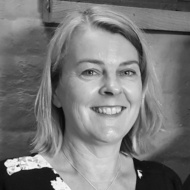What is your first sporting memory?
I think the first memory is probably of the sports days at the village fete. You’d win about 50p per race, and I remember entering everything, trying to pick up some change for the coconut shy.
Which sports did you most enjoy at school?
When I moved to Ryde School, I did all the main sports: netball, hockey and tennis. Tennis was probably my favourite sport as I’d played quite a lot growing up, but I probably enjoyed the team aspect of hockey the most.
What was the coaching like? Did it push you?
Our netball coach was particularly good. We had a really strong team in my year, and we mostly kept the same formation for about five years. We used to regularly beat local schools about 80-0 – which our headmaster enjoyed reading out! I never really loved netball as much as the other sports, but I’m glad my coach pushed me to keep up with it. In my final year, I wrecked my knee in a skiing crash so then I really missed being able to play.
How about the facilities? How did they enable you to develop as an athlete?
I think our facilities were probably pretty standard for a school; we had plenty of courts, pitches and an off-site astroturf. Since I’ve left, the school has started up a rowing club, which I would have loved to have been involved in.
Any other influences on your sporting development?
I’ve always switched around and done a lot of different sports. Out of school I did quite a bit of trampolining and surfing, and my mum was always great at taking me to practices or competitions when I was younger.
What sporting achievement are you most proud of?
At university, I picked up rowing after injuring my knee which stopped me from being able to do all the sports I had played at school. I rowed for my college in my first year and then for the Oxford University’s second boat in my second year, before becoming President of the Oxford University Women’s Boat Club in my third year.
I also competed in two skiing Varsity Matches for Oxford. I’d skied a lot but never raced before going to university, so that was a great opportunity. I’m amazed I was able to do it really; I did the first races with a torn ACL and cartilage (with a big knee brace on) and the second with the same knee injury, but also a broken back!
What have been your most difficult moments in your career as an athlete?
On my way to rowing training in my second year of university, I was a passenger in a car crash and broke my spine. Thankfully the spinal cord was intact, but I was extremely close to being paralysed. After surgery, I was adamant about getting healthy again, and the goal of racing in the Boat Race made me extremely determined. I got back into the gym two weeks after the crash and spent about four months gradually upping the amount of training. Six weeks before the race, I was able to get back into a boat and was just about fit enough to make the selection for the second boat, Osiris. I was really over the moon that I had been able to make it back so quickly, although it wasn’t entirely pain-free. Over the weeks, I re-learnt how to row and we beat Cambridge by three lengths come the Boat Race.
Tell us about what you’re up to currently in your career and your plans for the future?
I’m now at Cambridge for my PhD. My injuries make rowing pretty painful, and I just didn’t have the motivation to row for the opposition, so I’ve instead returned to athletics. I did a little bit of discus at school, and a bit at Oxford, but I’ve spent the last 18 months really dedicating myself to it and finally managed to get a full blue (which I never quite achieved in skiing or rowing at Oxford).
I’ve been elected as the President of Cambridge University Athletics Club for the upcoming year, so that will be another big task, but hopefully enjoyable. I’m interested to see if I can bring some of the stuff I learnt as a boat club president to running an athletics club. Finally, I’m doing some testing with some Paralympic sports in the next few months, to see if my spinal injury would make me eligible for Tokyo 2020. I think its probably quite a long shot, but worth a try!
Lastly, what do sports and physical exercise mean to you?
Sport is vital to help balance out an academic day. I don’t think its possible to work effectively for every hour of the day, and I’m sure that by taking time away from the books, your brain is then in a much better state when you are working.
I think that regularly taking part in sport keeps my competitive nature active, but also means I can channel it into one place rather than being too competitive about everything – although maybe my friends would disagree!










